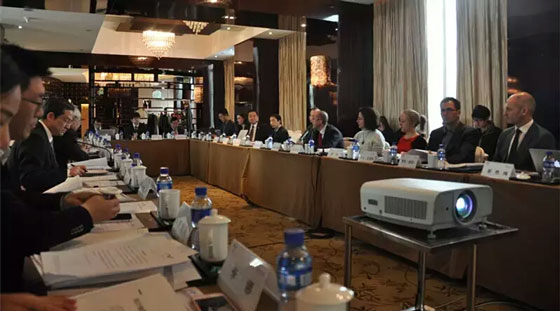China, UK urged to cooperate on conflict prevention
- By Chen Xia
 0 Comment(s)
0 Comment(s) Print
Print E-mail China.org.cn, March 2, 2016
E-mail China.org.cn, March 2, 2016
China and the UK should cooperate on conflict prevention despite their differences in the understandings of and solutions to this issue, according to the latest report released by Saferworld, an independent international organization working to prevent violent conflict and build safer lives, on Feb. 29 in Beijing.
 |
|
A seminar on conflict prevention is co-hosted by the Charhar Institute and Saferworld on Feb. 29 in Beijing. [Photo/The Charhar Institute] |
Partnership between the two countries should be created in a wide range of areas, such as countering extremism and radicalization, cyber security, tackling transnational organized crime, intelligence-sharing, global health, crisis response and defense production, revealed the report on Conflict Prevention in the 21st Century: China and the UK, which was released at a seminar co-hosted by the Charhar Institute and Saferworld.
Lyu Fengding, co-chairman of the Charhar Institute's International Advisory Committee, delivered a speech at the seminar. He noted the importance of conflict prevention as he had witnessed many conflicts in Nigeria when he served as China's ambassador there.
China and the UK should enhance bilateral cooperation, multilateral cooperation and people-to-people exchange to create a partnership in conflict prevention, and the cooperation must be flexible and reliable, said Bernardo Mariani, head of Saferworld's China Program.
Charlotte Jago, an official of the British Embassy in Beijing, said that China has become increasingly important in the world, so China and the UK should cooperate to prevent conflicts.
The seminar attracted many Chinese and foreign scholars on conflict prevention, professionals in safety and the security field and government officials.They discussed conflict prevention methods, cooperation between China and the UK, as well as the use of soft power in conflict prevention.
International cooperation on conflict prevention has become inevitable now, as all countries need to cope with the current international situation where traditional and non-traditional safety risks co-exist, the scholars said.
The discussions were chaired separately by Huang Youyi, secretary-general of the Charhar Institute's International Advisory Committee and former vice president and editor-in-chief of the China International Publishing Group, Zhang Chun, deputy director of the Center for West Asian & African Studies at Shanghai Institutes for International Studies and David Nyheim, chief executive, Europe Conflict and Security Consulting (ECAS) Ltd.






Go to Forum >>0 Comment(s)